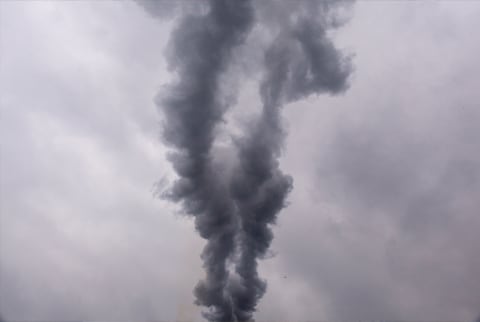Advertisement
Air Pollutants Congregate In The Liver, Lungs & More: How To Get Rid Of Them


According to shocking data recently published by the WHO, 99% of the global population1 breathes unhealthy air that's contaminated with pollutants. Left unchecked, unwanted toxins from the air can tax our detoxification organs and lead to health concerns now and later that affect our cardiovascular system, cognitive function, and more.
The lasting effects of air pollution on our health.
The truth is, we're exposed to an abundance of environmental toxins today, and the human body simply hasn't adapted to keep up with the burden it puts on our detoxification pathways.
It's not just air pollution that affects our ability to effectively detox, either—we're facing a myriad of toxins from chemicals, pesticides, paints, certain plastics, heavy metals, and other contaminants that all require targeted filtering and removal from the body.
Specifically, our six organs of elimination—the liver, lungs, skin, gastrointestinal tract, lymph, and kidneys—cannot function optimally when there's an overwhelming amount of unwanted compounds to remove.
How air pollution affects our detoxification organs.
Thanks to each elimination organ's unique role in filtering and removing unwanted compounds, our entire detoxification system is affected by air pollution. That said, there are a few organs that are more heavily affected by regular exposure to pollutants in the air (e.g., nitrogen dioxide, particulate matter, and ground-level ozone pollution).
Lungs
Air quality is a universally important metric of overall well-being, as our lungs work round the clock to filter the air we breathe and exhale unwanted compounds. In terms of susceptibility, individuals with lung health concerns2 or specific immune health considerations, older adults, and children are more likely to be affected by exposure to air pollutants.
However, anyone facing routine exposure to pollutants—in the air or elsewhere—will be more prone to a higher burden of toxin exposure and an increased need for toxin elimination (in the lungs and throughout the body).
Liver
Often considered the body's primary detoxification organ, the liver takes the brunt of an individual's toxin load—and air pollution is no different. A 2014 Toxicology Research review3 shows that particulate matter air pollutants (e.g., black carbon emissions that come from the incomplete combustion of fossil fuels and diesel exhaust particles from diesel-powered trucks and vehicles) can migrate from the lungs to the liver.
The translocation of these harsh compounds can stress the liver by fueling pro-inflammatory pathways, affecting the liver's ability to metabolize lipids, remove toxins, and more. Over time, these effects can greatly affect the body's detoxification pathways and lead to liver-related wear and tear (and health concerns).
Gastrointestinal tract
To talk about the gut, let's chat about the lungs one more time. You see, inhaled insoluble particles (such as air pollutants) that deposit in the lungs are enveloped in mucus and cleared from the lungs. This defense mechanism is called mucociliary clearance and helps the body effectively transport unwanted toxins from the lungs to the gastrointestinal (GI) tract—aka, your gut.
This mechanism exposes the lungs to harsh particulate matter from pollutants, which affects overall gut health and function. Emerging research reveals that air pollution has a profound effect on gut microbiota health4 and leaves lipids (especially polyunsaturated fatty acids, aka PUFAs) vulnerable to attacks from free radicals. This implicates not only the integrity of the detoxification system but whole-body health, as a healthy gut supports mental well-being, immune function, endocrine health (i.e., hormonal balance), and more.
What we can do to support our detox pathways.
While we can't solve the issue of widespread pollution, contaminants, and climate change in a day, there are many ways to support our elimination organs so they can effectively filter and remove unwanted toxins. Here are some daily (I repeat, daily) actions you can take to bolster your body's natural detoxification pathways:
- Eat plenty of antioxidant-rich foods to help neutralize free radicals.
- Add fiber to your diet to promote healthy bowel movements and remove unwanted compounds via poop.
- Make sure you're properly hydrated throughout the day so your kidneys can eliminate water-soluble toxins via urine.
- Take a high-quality targeted detox supplement (like mbg's liver detox+) that supports our detoxifying organs and helps combat whole-body oxidative stress.*
- Work up a sweat through exercise (or in the sauna) to remove unwanted compounds through your skin (another detox organ, by the way!).
The takeaway.
Detoxification is more important than ever. Thanks to widespread exposure to modern toxins in our air, water, and food, promoting healthy detox pathways is a 24/7 affair.
Embracing a daily detox lifestyle that prioritizes hydration, movement, and targeted, antioxidant-rich bioactives that support your liver, lungs, gut, and other detoxification organs is key to holistically promoting your body's elimination of unwanted pollutants and other toxins.*